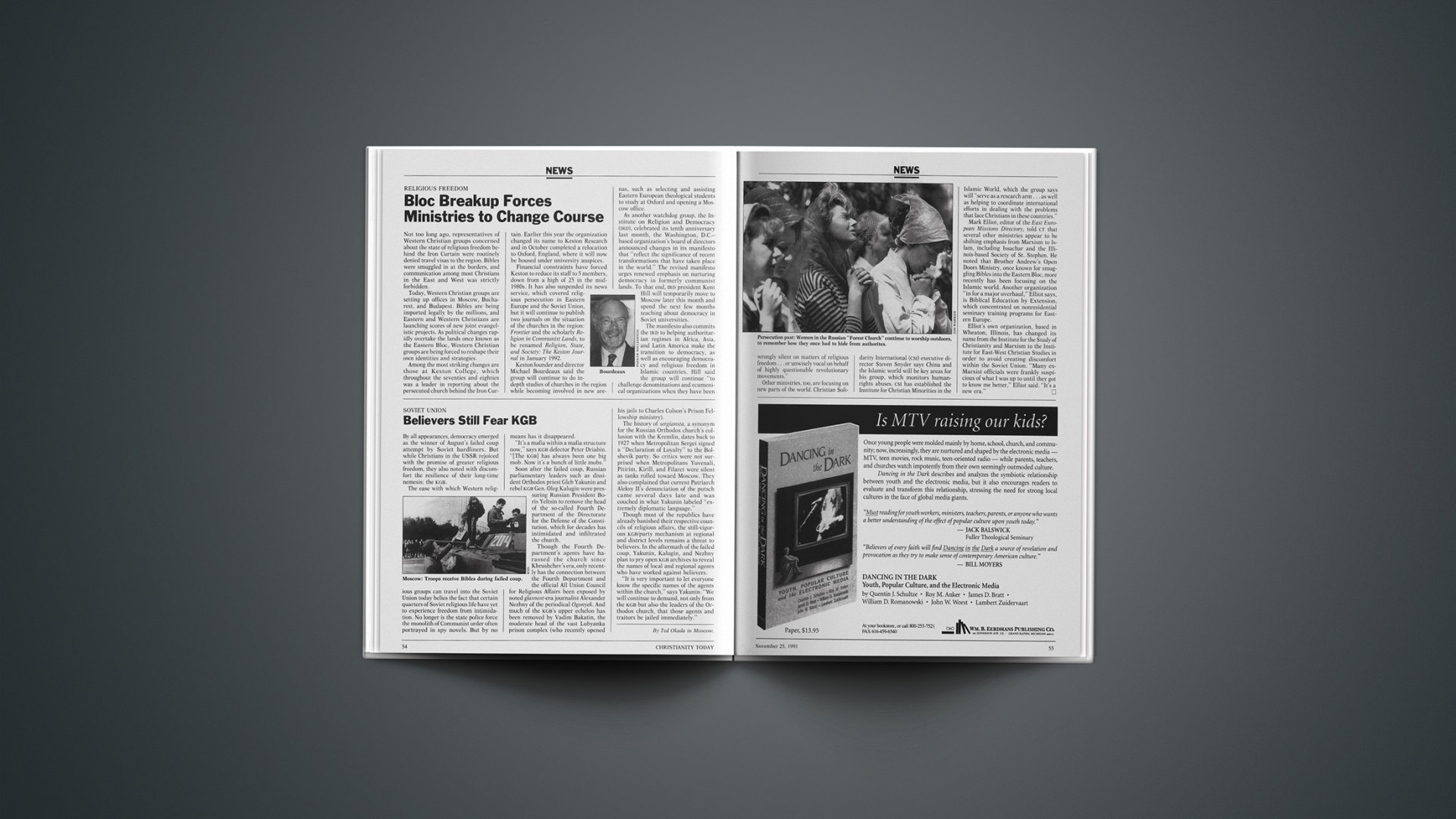Not too long ago, representatives of Western Christian groups concerned about the state of religious freedom behind the Iron Curtain were routinely denied travel visas to the region. Bibles were smuggled in at the borders, and communication among most Christians in the East and West was strictly forbidden.
Today, Western Christian groups are setting up offices in Moscow, Bucharest, and Budapest. Bibles are being imported legally by the millions, and Eastern and Western Christians are launching scores of new joint evangelistic projects. As political changes rapidly overtake the lands once known as the Eastern Bloc, Western Christian groups are being forced to reshape their own identities and strategies.
Among the most striking changes are those at Keston College, which throughout the seventies and eighties was a leader in reporting about the persecuted church behind the Iron Curtain. Earlier this year the organization changed its name to Keston Research and in October completed a relocation to Oxford, England, where it will now be housed under university auspices.
Financial constraints have forced Keston to reduce its staff to 5 members, down from a high of 25 in the mid-1980s. It has also suspended its news service, which covered religious persecution in Eastern Europe and the Soviet Union, but it will continue to publish two journals on the situation of the churches in the region: Frontier and the scholarly Religion in Communist Lands, to be renamed Religion, State, and Society: The Keston Journal in January 1992.
Keston founder and director Michael Bourdeaux said the group will continue to do in-depth studies of churches in the region while becoming involved in new arenas, such as selecting and assisting Eastern European theological students to study at Oxford and opening a Moscow office.
As another watchdog group, the Institute on Religion and Democracy (IRD), celebrated its tenth anniversary last month, the Washington, D.C.-based organization’s board of directors announced changes in its manifesto that “reflect the significance of recent transformations that have taken place in the world.” The revised manifesto urges renewed emphasis on nurturing democracy in formerly communist lands. To that end, IRD president Kent Hill will temporarily move to Moscow later this month and spend the next few months teaching about democracy in Soviet universities.
The manifesto also commits the IRD to helping authoritarian regimes in Africa, Asia, and Latin America make the transition to democracy, as well as encouraging democracy and religious freedom in Islamic countries. Hill said the group will continue “to challenge denominations and ecumenical organizations when they have been wrongly silent on matters of religious freedom … or unwisely vocal on behalf of highly questionable revolutionary movements.”
Other ministries, too, are focusing on new parts of the world. Christian Solidarity International (CSI) executive director Steven Snyder says China and the Islamic world will be key areas for his group, which monitors human-rights abuses. CSI has established the Institute for Christian Minorities in the Islamic World, which the group says will “serve as a research arm … as well as helping to coordinate international efforts in dealing with the problems that face Christians in these countries.”
Mark Elliot, editor of the East European Missions Directory, told CT that several other ministries appear to be shifting emphasis from Marxism to Islam, including Issachar and the Illinois-based Society of St. Stephen. He noted that Brother Andrew’s Open Doors Ministry, once known for smuggling Bibles into the Eastern Bloc, more recently has been focusing on the Islamic world. Another organization “in for a major overhaul,” Elliot says, is Biblical Education by Extension, which concentrated on nonresidential seminary training programs for Eastern Europe.
Elliot’s own organization, based in Wheaton, Illinois, has changed its name from the Institute for the Study of Christianity and Marxism to the Institute for East-West Christian Studies in order to avoid creating discomfort within the Soviet Union. “Many ex-Marxist officials were frankly suspicious of what I was up to until they got to know me better,” Elliot said. “It’s a new era.”










